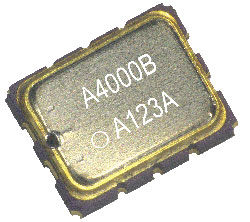Epson Now Shipping Samples of Compact, High-Precision RTC Modules for In-Vehicle Applications
- Accuracy of clock and additional functions guaranteed up to 125℃ -

- TOKYO, Japan, December 13, 2021 -
Seiko Epson Corporation (TSE: 6724, "Epson") has begun shipping samples of the RA8000CE and RA4000CE, two new RTC (real-time clock) modules1 for in-vehicle applications with a built-in digital temperature-compensated crystal oscillator (DTCXO2).
These are Epson's first RTC modules with a built-in DTCXO to support operating temperatures up to 125℃ and be AEC-Q1003 compliant to provide accurate and reliable time information.
Automotive manufacturers require devices that comply with vehicle reliability test standards. And the growing number of electronics and functions being added to vehicles is creating greater demand for automotive devices that operate on low current and in high temperature environments. Epson's RTC modules are used in many automotive applications because we guarantee that our modules are compliant with AEC-Q100 and meet customer needs by designing, developing, and fabricating the integrated circuits used in them.
The operating temperature range of the new RA8000CE and RA4000CE was widened to -40℃ to +125℃, a wider range than Epson's current automotive product, the RA8804CE. The number of time stamp records has been expanded to two, and a new Reset Output function has been added. This function improves the safety of the customer's system by detecting when the power supply falls below a certain threshold and outputting a reset signal to peripheral devices. The new modules are available with either an I2C-Bus interface or an SPI-Bus interface to give customers more options.
Epson seeks to advance the frontiers of industry and drive the circular economy by applying the efficient, compact, and precision technologies that it has developed over many years to solve challenges. These technologies, which save energy, enable smaller products, and increase accuracy and precision, enable Epson to contribute to the Sustainable Development Goals (SDGs), which will bring about a better and more sustainable future for all.
Product applications
These products are ideal for in-vehicle equipment such as battery management systems and automotive master clocks as well as for factory automation equipment that requires a device that operates in high-temperature environments.
Related links
Please see the links below for further details about these products.
RA8000CE: https://www5.epsondevice.com/en/products/rtc/ra8000ce.html
RA4000CE: https://www5.epsondevice.com/en/products/rtc/ra4000ce.html
Please see the link below for information on methods for solving issues involving the timekeeping accuracy and current consumption of in-vehicle systems.
Website URL: https://www5.epsondevice.com/en/products/lp/ra4000ce_ra8000ce.html#sub03
Product specifications
| Product name | RA8000CE | RA4000CE |
|---|---|---|
| Interface type | I2C-Bus | SPI-Bus |
| Interface power supply voltage | 1.6 V to 5.5 V | |
| Timekeeping current consumption | 300 nA (Typ.)/ at 3.0 V * Without reset output function | |
| Operating temperature range | -40℃ to +125℃ | |
| Frequency stability | ±5.0 x 10-6 / -40℃ to +85℃ (error ≤ ±13.2 sec. per month) ±8.0 x 10-6 / +85℃ to +105℃ (error ≤ ±21 sec. per month) ±50.0 x 10-6 / +105℃ to +125℃ (error ≤ ±132 sec. per month) |
|
| Functions | Reset output (selectable as an option) Time stamp: Records from 1/1024 sec. to year. Max. 2 times Binary counter that can count units in seconds such as in Unix time |
|
| Automotive reliability standard | AEC-Q100 compliant | |
| Dimensions | 3.2 x 2.5 x 1.0 (Max.) mm | |
*1 RTC (real-time clock) module: A single-package product that has a real-time clock IC with clock, calendar, and other functions and an integrated 32.768 kHz crystal unit. These modules not only benefit users by eliminating the need to design oscillator circuits and adjust clock accuracy, their small size and level of integration also allow customers to use their board space more efficiently.
*2 DTCXO: A digital temperature compensated X'tal (crystal) oscillator is an oscillator (crystal unit and oscillation circuit) with a function that applies corrections to frequencies, which change in response to the ambient temperature of the crystal unit. To output a stable frequency within a range of temperatures, TCXOs have a circuit that compensates the output frequency based on signals from a temperature sensor. DTCXOs use a digital circuit to compensate the frequency of the oscillator.
*3 AEC-Q100: The Automotive Electronics Council (AEC) is an industry group that creates standards for the reliability and qualification of automotive electronics. It was formed by the "Big Three" U.S. automobile manufacturers in partnership with major electronic component manufacturers. The AEC standard is a de facto global standard that has been widely adopted as a standard for automotive electronic components.
About Epson
Epson is a global technology leader dedicated to co-creating sustainability and enriching communities by leveraging its efficient, compact, and precision technologies and digital technologies to connect people, things, and information. The company is focused on solving societal issues through innovations in home and office printing, commercial and industrial printing, manufacturing, visual and lifestyle. Epson will become carbon negative and eliminate use of exhaustible underground resources such as oil and metal by 2050.
Led by the Japan-based Seiko Epson Corporation, the worldwide Epson Group generates annual sales of around JPY 1 trillion.
corporate.epson/en/


